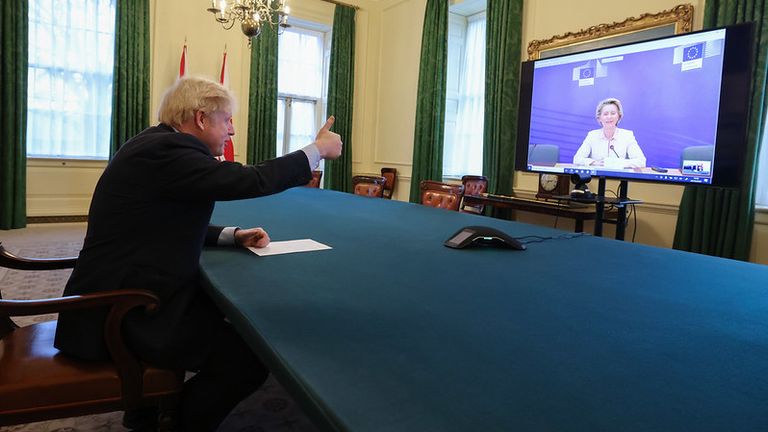So how will Europe feel about the UK finally walking out of the EU door?
Well, it will mean different things to different countries, and there will be plenty who are relieved that the saga of Brexit negotiations has come to an end.
Follow live updates and reaction to Brexit breakthrough
They will be satisfied that a deal has been done but, across the EU, just about nobody will be truly happy to see the UK go.
There are very few things that unite this continent. You can’t really generalise about its people, its culture, its politics or attitudes but an antipathy to Brexit is pretty commonplace. During these negotiations, I’ve chatted to diplomats from north, south, east and west, and none of them wanted us to leave the EU.
So the first thing we leave in our wake is a sense of sadness. Nobody in Brussels is pretending that the European Union is better because Britain has left, and the regret has seeped out of its leaders for years now.
When I first moved to Brussels, about 18 months ago, people used to make affectionate jokes about calling the whole thing off and welcoming Britain back to the family. “Do you really think Brexit will happen?” I was asked, not long after moving in. When I said that yes, I did think we would leave, the response was one of mild shock, sadness and regret.
Now, there are layers of weariness and irritation blended in with that regret. Brexit negotiations have done little to improve Britain’s standing within Brussels, even if Lord David Frost has his admirers as a quietly effective diplomat. The row over the Internal Market Bill, for instance, made a deep impression on Brussels diplomats. It was, according to one, a sign that “Britain’s reputation for prizing the law above all isn’t quite as robust as we had always thought”.
Of course, we’ve always been the awkward member of the pack. They’ve always known that we were an island nation, uneasy in our relationship with the continent of Europe and dubious about the spectre of a federal superstate.
But in Brussels, there was a feeling that, through rebates, opt-outs and political deals, the wound had been dressed, if not healed. That the EU had recognised the UK as a special case – the country that would never be expected to join the single currency, or stick to every rule.
And then came the Brexit vote, and the reckoning that followed. Other anti-establishment parties flourished, either because of inspiration or coincidence, and anti-EU sentiment seemed to flower across Europe.
But then, it fell again, and it has kept falling. Support for EU membership has risen, across the bloc, since the 2016 referendum. On Nigel Farage’s last day at the European Parliament, he confidently told me that the UK’s departure would be the precipitant for others to depart. So far, there is not much sign of that happening.
That isn’t to say it can’t happen. One diplomat told me he was nervous that if Britain prospered after Brexit, then “exit” politicians in his own country would be re-energised. But, for the moment, it’s hard to find anyone who thinks that the UK has blazed a trail that their voters want to follow.
That isn’t to say that the EU is a particularly happy ship at the moment. It isn’t. First, it was split by proposals to offer financial support to countries badly hit by COVID-19 (notably Italy and Spain) and now its budgetary plans are being halted by the opposition of Poland and Hungary, themselves angry about new laws designed to counteract authoritarianism.
It is, ironically, precisely the sort of inter-Europe punch-up that often used to end with a piece of British diplomatic alchemy. For a long time, the UK was seen as being a step apart from the melee – a bulwark between the combined hopes of the smaller nations, the pragmatism of the middle ranks, and the double-act of France and Germany.
“That is the biggest problem for us,” said one senior diplomat from an eastern European nation. “Not the money, not fishing, but diplomacy. You used to stand up for us. Now nobody will.”
Instead, there are signs of the EU fracturing. Poland and Hungary have blocked the annual budget in a dispute over “rule of law” regulations designed to curtail authoritarianism; north and south argued over how to finance the COVID recovery plan.
And in the midst of this, Britain leaves the EU stage. It can be easy for a Briton to lose sight of the symbolism of that, but ponder what the UK is – a strong economic partner, with historic links around the world; a political player with a permanent seat on the UN’s security council; a NATO member, with significant armed forces; a cultural powerhouse, whose language is still the most widely spoken in Europe.
You don’t wave goodbye to that easily, and nor do you want to lose touch. Nor, for that matter, will the UK want to cold-shoulder a trading bloc on its doorstep – a union that is comprised of most of the countries we know best.
So, like a good divorce, both sides will aim to go from partnership to friendship. And, like any divorce, that’s going to feel really awkward at times.




